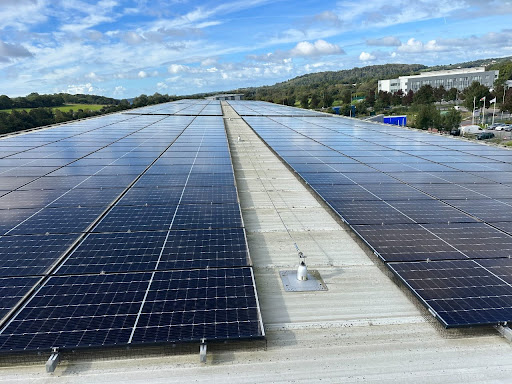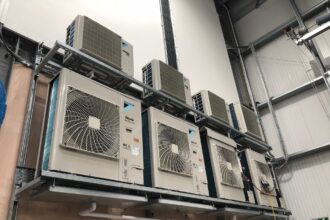As businesses face rising energy costs, increased sustainability expectations, and the need to future-proof operations, many are turning to commercial solar panels as a solution. Solar energy offers financial, environmental, and strategic benefits that can help organizations of all sizes thrive in a competitive and eco-conscious marketplace. This guide explores the full scope of advantages, outlines the installation process in the UK, and details available grants and incentives that can significantly lower the barrier to entry.
Why Invest in Commercial Solar Panels?
Energy Cost Savings
One of the most compelling reasons to invest in commercial solar panels is the potential for long-term cost savings. By generating your own electricity, your business can significantly cut its reliance on grid power.
Protection Against Price Volatility and Energy Independence
Solar power offers greater control over your energy sources and a hedge against fluctuating utility rates, enabling more predictable energy budgeting.
Use solar PV panels to generate your own power, these can be combined with battery systems to store excess energy for use during non-sunlight hours and/or minimize exposure to blackouts or energy supply interruptions.
Return on Investment (ROI):
Systems generally pay for themselves within 10 years, whilst a majority repay the cost of investment in 5 or less, while the panels typically generate electricity for 25–30 years.
Sustainability, Carbon Footprint Reduction and Enhanced Brand Image:
Solar energy is a clean, renewable power source that reduces your greenhouse gas emissions. Eco-conscious consumers and partners often prefer businesses that prioritize sustainability and adopting solar energy demonstrates your commitment to environmental responsibility.
Compliance:
With increasing government pressure to reduce or reverse the effects of global warming, provide cleaner air to protect public health, and the associated net zero emissions targets, solar energy helps ensure regulatory alignment.
Understanding the Commercial Solar Installation Process in the UK
Initial Feasibility Assessment
Before installation, a solar energy provider will assess:
- Your site’s solar potential (roof orientation, shading, available space).
- Energy usage patterns.
- Structural integrity of your building.
System Design and Proposal
Based on the assessment, engineers will design a custom system tailored to your needs, including:
- Panel layout and system capacity.
- Inverter selection.
- Battery storage (if applicable).
- Estimated energy savings and ROI.
Planning and Permissions
Most commercial solar systems are permitted developments, but larger systems may require:
- Planning permission from your local council.
- Grid connection approval from the DNO (Distribution Network Operator).
- Compliance with building and fire safety regulations.
Installation and Commissioning
- Installation Timeline: Typically, 2–6 weeks, this is dependent on system size.
- Minimal Disruption: Installations are often scheduled to avoid operational downtime.
- System Commissioning: Ensures everything is working and connected to the grid properly.
Ongoing Maintenance and Monitoring
Modern systems include real-time performance monitoring and may come with maintenance packages or workmanships’ warranties to ensure optimal performance throughout the system’s lifespan. Excel Energy provide a comprehensive five year workmanship warranty and maintenance with every system that they supply and install, giving you peace of mind for the future.
Key Solar Panel Grants, Incentive Schemes and Financial Support in the UK
Smart Export Guarantee (SEG)
- Businesses earn money by exporting unused electricity back to the grid.
- Mandatory for licensed energy suppliers
- Rates vary by provider
- No upfront costs, just income from surplus energy
Enhanced Capital Allowance (ECA) Scheme
Allows businesses to write off the full cost of solar equipment against taxable profits in the year of purchase and is applicable for qualifying energy-saving technologies, this helps improve short-term cash flow.
Industrial Energy Transformation Fund (IETF)
For larger energy-intensive businesses aiming to transition to low-carbon energy sources. This is mainly targeted at manufacturing and industrial sites and covers feasibility studies, equipment upgrades, and energy efficiency investments
Local Authority and Regional Grants
Depending on your location, councils or regional development bodies may offer one or more of the following:
- Green Business Grants
- Low-carbon innovation funding
- SME-specific renewable energy support
Example: Greater London Authority, Scottish Enterprise, and the West of England Combined Authority have active programs supporting solar adoption.
How Solar Grants Reduce Upfront Costs
Solar panel grants can cover a substantial portion of the installation costs, improving the financial case for adoption. These incentives vary by region, industry, and system size, but typically include:
- Direct grants or capital contributions
- Tax relief schemes
Low-interest green loans
How to Apply for Solar Panel Grants
- Assess Eligibility: Most grants have industry, size, or location-based criteria.
- Work with a Certified Installer: Many providers assist with grant applications as part of their service, including Excel Energy Ltd, who provide a complete, turnkey service, from concept to completion.
- Prepare Required Documentation: This includes energy usage data, financials, and a business case.
- Apply Early: Funding is often limited and allocated on a first-come, first-served basis.
Tips for a Successful Solar Investment
- Partner with an MCS-Certified Installer: Ensures quality installation and eligibility for incentives.
- Conduct a Full Energy Audit: Identifies other savings opportunities and improves system sizing accuracy.
- Consider Battery Storage: Especially useful for high-energy users or those seeking maximum independence. More information can be found here
- Plan for the Long Term: Choose durable systems with solid warranties and service support.
Resources for Business Owners
- Energy Saving Trust – Business Solar Guidance
- Gov.uk – Business Energy Efficiency and Grants
- Solar Energy UK – Industry Updates and Installer Directory
- Carbon Trust – SME Support and Energy Efficiency
Switching to commercial solar panels is a powerful way for businesses to cut costs, improve sustainability credentials, and gain energy independence. With generous grants and tax incentives available, the initial investment can be significantly reduced, making solar a practical and profitable decision for most UK businesses. Whether you’re a small enterprise or a large industrial operator, solar energy can be a cornerstone of a more efficient, sustainable, and future-ready business strategy. Excel Energy are an award-winning supplier and installer who can guide you through this entire process, contact Excel Energy today to receive a free quote and see the savings to your company’s bottom line and the environment that can be made.

















